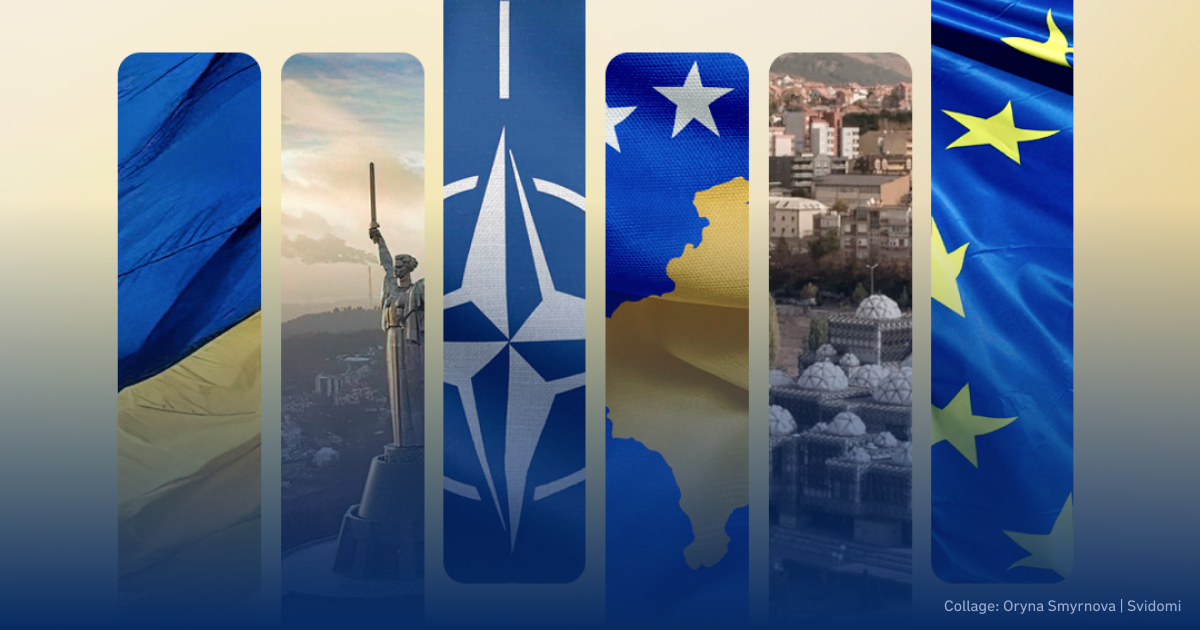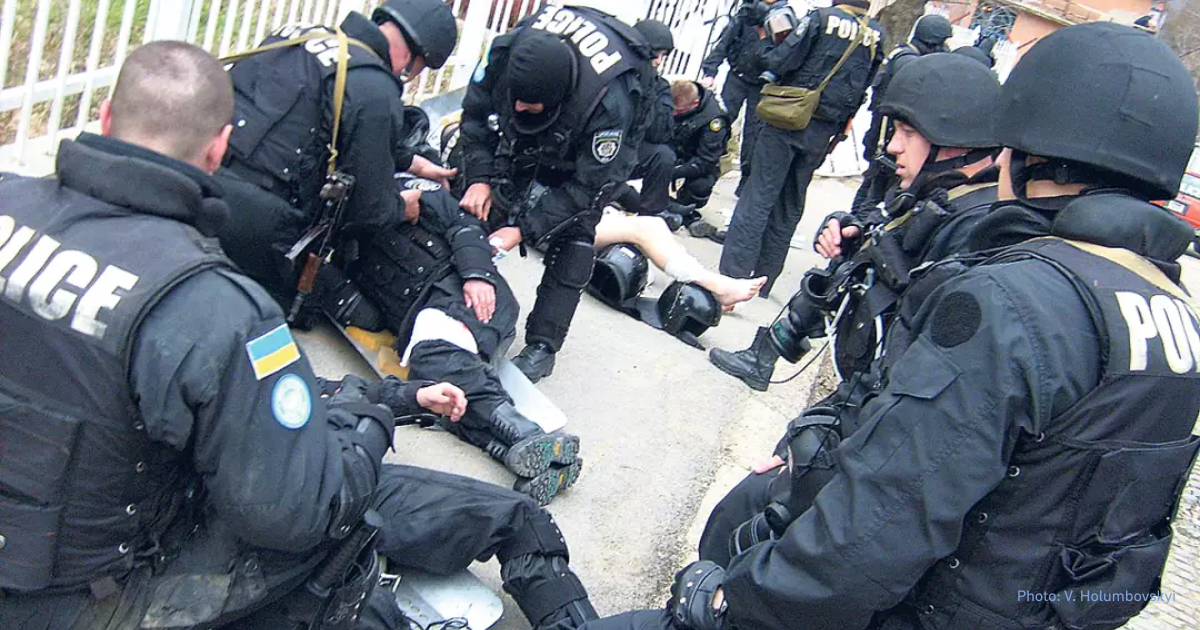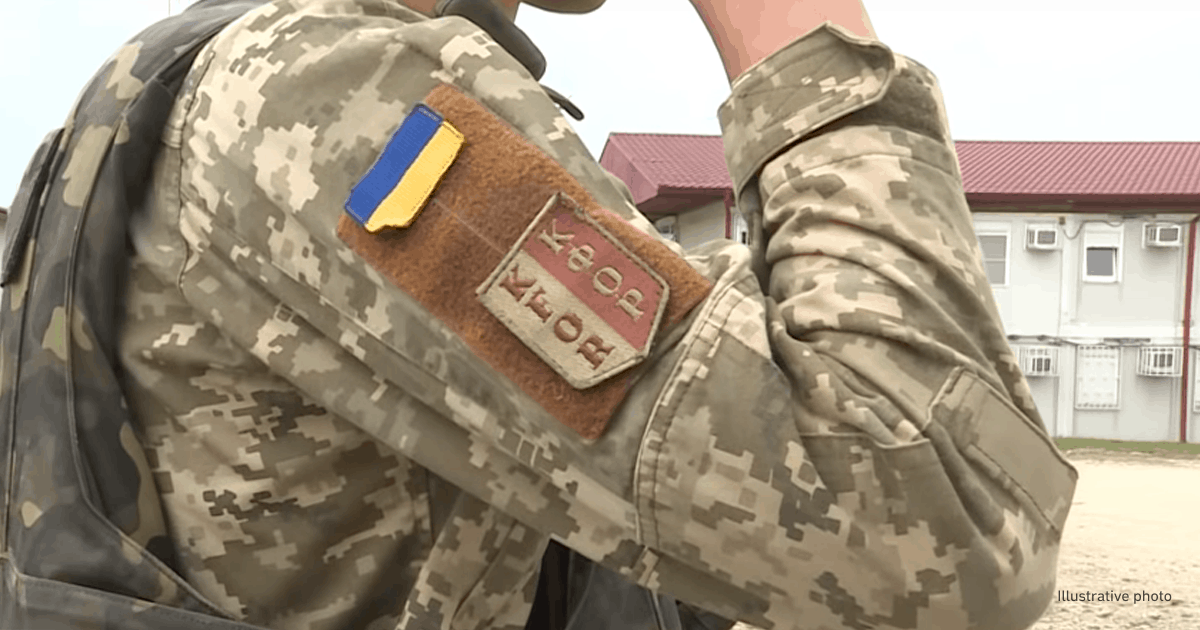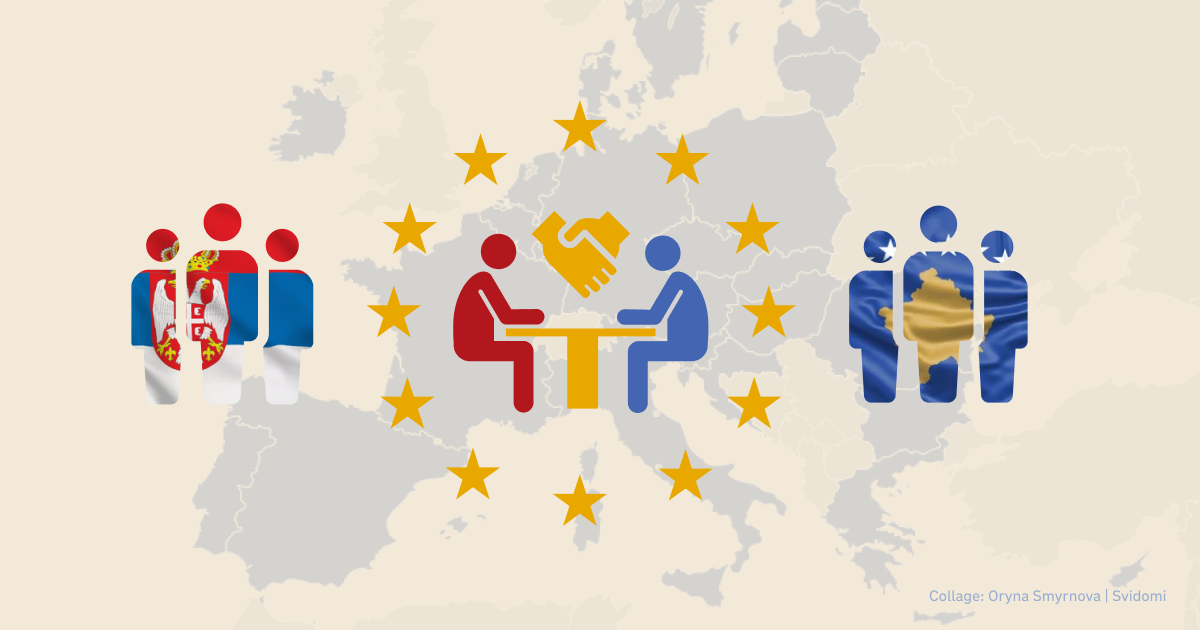Invisible ally. Why Kosovo supports Ukraine in the war against Russia

Kosovo is a small, partially recognised state in the Balkan Peninsula, created after the break-up of Yugoslavia and the war on the peninsula. Serbia does not recognise Kosovo and considers it part of its country. Nevertheless, 104 countries in th world recognise Kosovo.
Kosovo is a potential candidate for membership in the European Union and has applied for membership in 2022. The partially recognised state is also seeking NATO membership. In its aspirations to join the European and Atlantic alliances, Kosovo is pursuing a policy that correlates with the policies of the EU and NATO. Supporting Ukraine in its war against Russia is part of this policy.
Svidomi explains how Kosovo supports Ukraine and how Ukrainian-Kosovan relations are developing.
How Kosovo supports Ukraine
In May 2022, Kosovo joined international sanctions against Russia and Belarus. The sanctions included an asset freeze, a travel ban on sanctioned individuals, and transferring their assets outside the country. In this way, the partially recognised state sought to show which side it was on in Russia's war against Ukraine.
However, the Kosovo government went beyond sanctions against Russia. In 2024, Kosovo began providing military assistance to Ukraine. Equipment already transferred includes trucks, armoured vehicles and mortar shells. Kosovo and the British armed forces are also helping train Ukrainian soldiers in the UK.
"We are determined to strongly support Ukraine in all aspects according to our conditions and capabilities," Kosovo's Defence Minister Ejup Maqedonci told Ukrainian journalists in Pristina, the country's capital.
Alex Anderson, a British researcher on conflicts in the Balkans, the Caucasus and Russia's war against Ukraine, and former Kosovo project director for the International Crisis Group, says that Ukraine's support for Kosovo is first and foremost an expression of its values, as well as a rapprochement based on the shared experiences of the two nations.

Kosovo suffered similar atrocities at the hands of a powerful neighbour, Serbia, in the 1990s. The massacres, rapes and pillaging that have characterised Russian military occupation of parts of Ukraine, most vividly documented in Bucha and the now de-occupied north, mirror what Serbian forces did to Kosovo in 1998-1999. Today’s Serbia is unapologetic, run by politicians who were in that Milosevic government of the 1990s (Serbian President Aleksandar Vučić was the Minister of Information Policy under President Slobodan Milošević in the 1990s during the war in Yugoslavia — ed.), who are allied with Russia, and fomenting the idea of renewed military incursion into Kosovo,
he explains the tendency of Kosovo and Kosovars to support Ukraine in the war.
For Kosovo, support for Ukraine is another part of the struggle against Serbia. Serbia continues to provoke Kosovo, the independence it does not recognise. In 2021, during the COVID-19 coronavirus pandemic, the Serbian government announced the vaccination of residents in the ethnic Serb-majority region of North Mitrovica. Serbia did not inform the Kosovo government of the vaccination process, leading Kosovo to describe the vaccination as 'illegal' and 'dangerous' for residents.
In September 2023, an armed group attacked Kosovo police officers on the border with Serbia. The Kosovo government accused Serbia of provocation and trying to create an uncontrolled corridor between Kosovo and Serbia.
"This group came from Serbia, they are trained in Serbia, financed by them and also equipped by the army of Serbia and its police," Xhelal Sveçla, Kosovo's Minister of Interior, told the Guardian.

Ukraine's military support shows that Kosovo, which is in danger, is ready to help Ukraine in the war.
Afrim Hoti, a professor at the University of Pristina, says NATO already has a contingent in Kosovo, so the country does not fear direct aggression from Serbia.

Unlike the Ukraine case, needing military assistance, Kosovo has another objective, that's of NATO membership. I know that NATO membership is also Ukraine's objective, but circumstances in Kosovo for such membership are much more realistic. Such circumstances leave space for "symbolic military assistance" for Ukraine. Similar was the decision of Kosovo authorities to pose sanctions toward all these steps, to prove that country stands in the same line of the history, that's from the West,
he explains the proactive assistance of the Kosovo authorities to Ukraine.
Kosovo also supports Ukraine internationally. Kosovo participated in the first peace summit in Switzerland in June 2024, which Ukraine hosted to work out a 'peace formula' — a comprehensive solution to end the war with Russia. As early as May 2024, Kosovo's Foreign Minister Donika Gërvalla-Schwarz spoke of the need to support Ukraine, pointing to the shared experience of the two countries.
"Ukraine hasn't recognised the Republic of Kosovo as a state, but we really believe that we know exactly what Ukraine is going through," she told the Associated Press.
Alex Anderson says the shared experience of Ukraine and Kosovo goes much deeper than the wars of the late 20th and early 21st centuries waged against these countries by Serbia and Russia.
"In modern times, both Ukraine and Kosovo arose from the collapse of multinational socialist federations — the USSR and Yugoslavia. Both Ukraine and Kosovo were drawn into these respective federations primarily by forcible conquest in the early 20th century. Serbia invaded and conquered Kosovo in 1912. Russia conquered Ukraine in 1919. During the following decades, both countries suffered from cultural and linguistic oppression. Ukraine suffered a Shot Renaissance at the hands of Russia, Serbia killed Kosovar intellectuals: Yusuf Gervalla (Albanian writer, killed in 1982 — ed.), Fehmi Agani (Kosovar politician, killed by Serbian soldiers during the war on the peninsula — ed.), Bayram Kelmendi (lawyer and human rights defender in Kosovo, killed in 1999 by the Serbian police in Pristina — ed.). Russia wants to reassert its dominance over Eastern Europe, while Serbia wants to reverse the outcome of the 1990s Balkan war and seize territory in Kosovo, Bosnia and Herzegovina and re-conquer Montenegro. Russia supports this, as a renewed conflict in the Balkans will deprive Ukraine of Western support. So, the Serbian and Russian agendas are intertwined," Anderson describes the similarities between the two countries in their struggle to regain independence against empires.

Relations between Ukraine and Kosovo
In 1999, as NATO was winding down its military operation, the Allied Forces in Serbia and Kosovo as part of the end of that part of the Balkan war. The Alliance established KFOR in June of that year, an international force under NATO command responsible for ensuring stability in Kosovo. The UN Security Council endorsed this mission in Kosovo.
Ukrainian forces joined KFOR in September 1999. Ukraine joined the mission as a NATO ally. A year later, Ukrainian troops on rotation in Kosovo were replaced by those already trained and cohesive within the Ukrainian-Polish Battalion (UkrPolBat). As early as 1997, Ukraine and Poland signed an agreement on joint military exercises and participation in peacekeeping missions under the auspices of the United Nations. Ukrainian special forces from the Ministry of Internal Affairs also took part in peacekeeping missions in Kosovo.
On March 18, 2008, the year of Kosovo's declaration of independence from Serbia, Ukrainian peacekeepers took part in an operation in Mitrovica. At the time, Serbs opposed to Kosovo's independence were staging clashes and pogroms. Around 300 demonstrators occupied the District Court building during these events and barricaded themselves inside.

After unsuccessful negotiations, the deputy head of the UN mission, American Lawrence Rossin, ordered 500 members of the UN police contingent to storm the barricades. Among them were 150 Ukrainians. As a result, 15 officers of the Special Forces of the Ukrainian Ministry of Internal Affairs were injured, and Senior Lieutenant Ihor Kinal died of shrapnel wounds from a grenade thrown into the crowd by Serbian demonstrators. The Serbs then used firearms against the peacekeepers.
It was the most violent day since Kosovo's declaration of independence. Seventy-three Serb demonstrators, 63 UN police and a dozen NATO soldiers were injured.
After the full-scale invasion began in February 2024, President Volodymyr Zelenskyy withdrew Ukrainian troops from all peacekeeping missions, including Kosovo. They were to return to Ukraine to defend the country against Russian aggression.

Svidomi has already discussed Ukrainian peacekeeping missions in which Ukrainian soldiers saved the lives of the people they were supposed to protect.
Alex Anderson believes that Ukrainian peacekeepers have not played a significant role in shaping the position of the Kosovo government and public opinion in support of Ukraine.
"Kosovar public opinion is unshakable, and it does not matter what impression the Ukrainians made on local residents. In Kosovo, I remember the Ukrainian contingent of KFOR operated around the southern municipality of Štrpce with a Serbian majority, which is a ski resort. Therefore, no, the peacekeepers did not influence the perception of Ukraine and its support," he says, explaining the Kosovars' attitude to Ukraine.
Ukraine does not have diplomatic representation in Kosovo. Ukrainian missions in Serbia provide all consular services, although Ukraine de facto respects Kosovo's separate rules for visiting Kosovo. Kosovo has no representation in Ukraine. As a result, relations between Ukraine and Kosovo as an independent state are more de facto — through peacekeeping missions and exchanges of experience between various missions and state bodies — than direct diplomatic relations. Although Kosovo participated in the peace summit in Switzerland and supported Ukraine, there is no talk of establishing diplomatic relations.
How Ukraine should treat Kosovo
Ukraine does not recognise Kosovo officially. Only in 2020 did Ukraine recognise passports issued by Kosovo, but diplomatic passports are not on this list. In 2020, former Deputy Foreign Minister Vasyl Bodnar commented on the possibility of recognising Kosovo, saying that 'traditionally we are in favour of territorial sovereignty'.
In 2022, Oleksandr Merezhko, MP and Chairman of the Verkhovna Rada Foreign Affairs Committee, said that recognising Kosovo could show other countries that Ukraine is inconsistent in these actions.
"We have always strongly defended territorial integrity, which is a fundamental principle of international law. And we did not see the right of self-determination of peoples as giving them the right to secede, to break away and create their own state," he told RFE/RL.
Non-recognition of Kosovo does not prevent Ukraine from having social and economic ties with the country. For example, Ukraine regularly competes against Kosovo in team sports, including football, because Kosovo is a member of UEFA, the Union of European Football Associations.
Alex Anderson says it is only a matter of time before Ukraine recognises Kosovo's independence.

Of course, in Kosovo, they want this recognition to come now, but here, they appreciate the terrible pressure that Ukraine is under. Getting rid of Russian influences in foreign policy approaches is more than just one step. Ukrainians who actually visit Kosovo quickly orientate themselves to the situation. Those who want and have low objectivity in Kosovo issues, orienting themselves in the situation, return to Kosovo to work on the unification of Ukraine and Kosovo,
he says.
The European Union sees Kosovo as a potential candidate for membership. However, not all EU countries recognise Kosovo's independence. Cyprus, Spain, Greece, Slovakia and Romania are among these countries. Nevertheless, the European Union is ready to accept Kosovo into its membership, of course, after the normalisation of relations between Kosovo and Serbia.
There have already been attempts to normalise relations between the two countries. For example, in April 2013, Serbia and Kosovo signed an agreement in Brussels in which both sides agreed not to block each other's efforts to join the EU. Serbs in northern Kosovo were allowed to have their own police force and court of appeal. Kosovo's parliament ratified the agreement later that month.
The agreement did not mean that Serbia recognised Kosovo's independence. However, it did allow the start of accession negotiations between the EU and Serbia, as well as an association agreement between Kosovo and the EU.

Serbia still does not recognise Kosovo's independence. In May 2023, clashes broke out in the northern regions of Kosovo — Kosovo Mitrovica and Pristina — involving members of the Serb minority, Kosovo police and NATO peacekeepers. This followed local elections in April in which ethnic Albanians won mayoralties. According to Kosovo's Prime Minister Albin Kurti, 'fascist mobs controlled by the Serbian government' are to blame for the clashes. More than 30 NATO peacekeepers were injured in the violence. The Council of the European Union immediately called for a de-escalation of the conflict between Kosovo and Serbia, threatening 'negative consequences' if the conflict escalated further.
Kosovo applied for membership in the European Union in 2022. Kosovo also adopted the euro as its official currency in 2002. In 2008, after gaining independence, they made it their official currency.
In its pro-European movement, Kosovo adheres to EU policies in all areas, says Professor Afmi Hoti. It supports Ukraine because the European Union does.
"Every single Kosovar citizen stands with Ukraine. Recognition by Ukraine is important and welcome but not crucial. Nothing changes if Ukraine recognises Kosovo. It will be one more recognition only. More than this, it is to prove that we are in the same political and ideological pattern. Both countries faced aggression, massive human rights violations and maybe genocide, and both countries fought for the same values. Whoever in Europe thinks of a Russian ally in the EU, think of Serbia immediately. Analogically, Ukraine stood in Kosovo's position more than two decades ago. Beyond this, recognition and the same path of EU and NATO integration will follow together," he says of the shared values between Ukraine and Kosovo.
So, should Ukraine recognise Kosovo on its way to the European Union? So far, the EU has not made such a demand of its member states, such as Spain or Greece. However, perhaps after the problems in relations between Serbia and Kosovo are resolved, the EU's position will change, and Ukraine will have to address this issue.
Svidomi asked the Ministry of Foreign Affairs to explain the situation with the recognition of Kosovo's independence from 2024 and the establishment of diplomatic relations, but at the time of publication of this article, no reply had been received.


